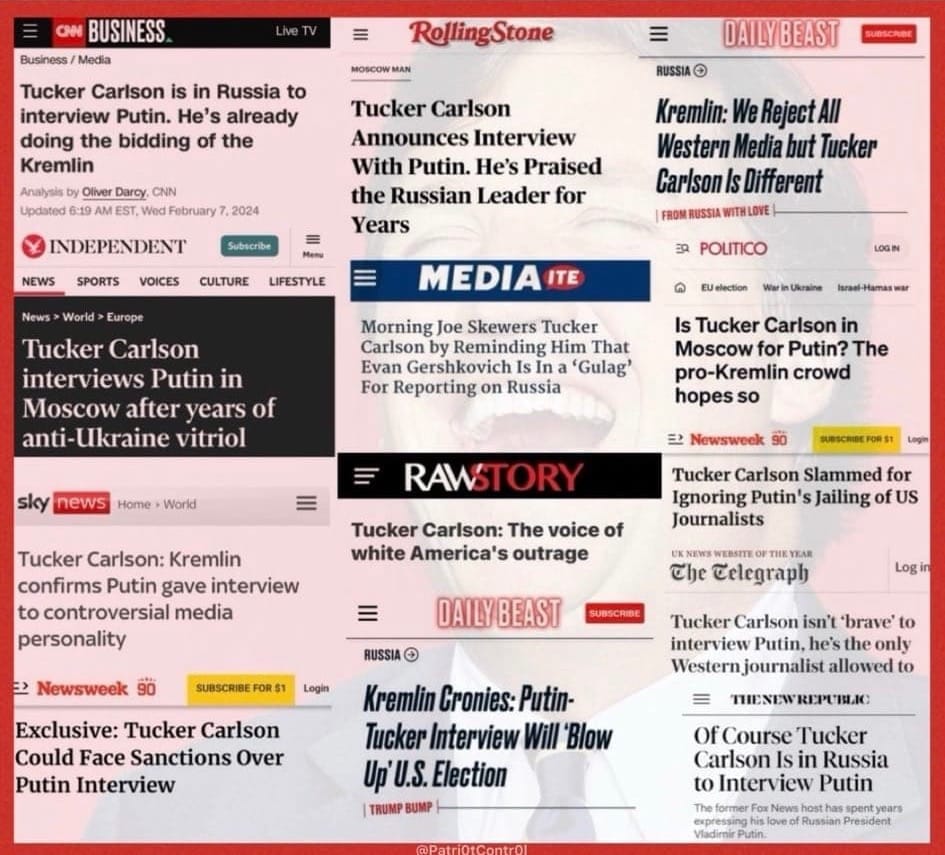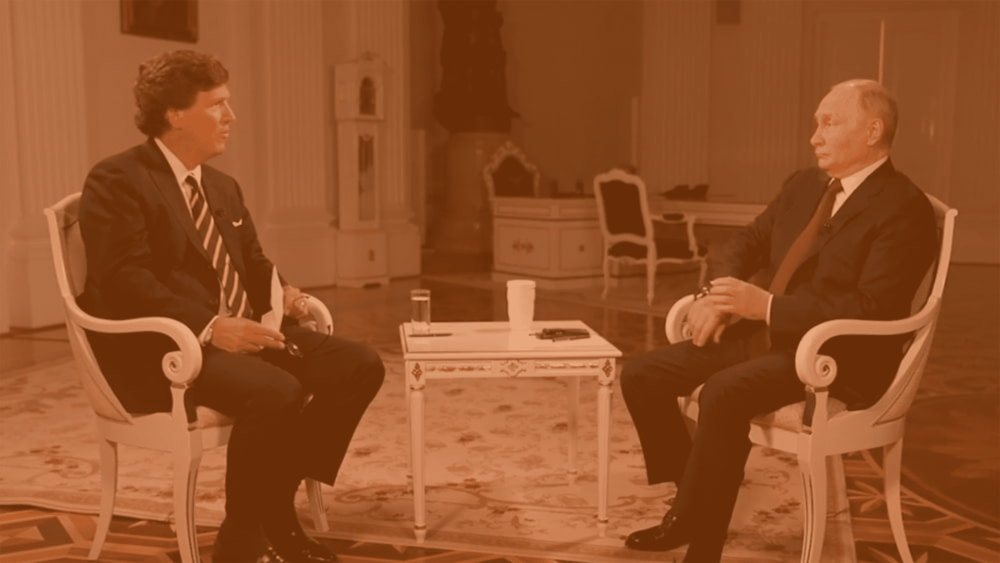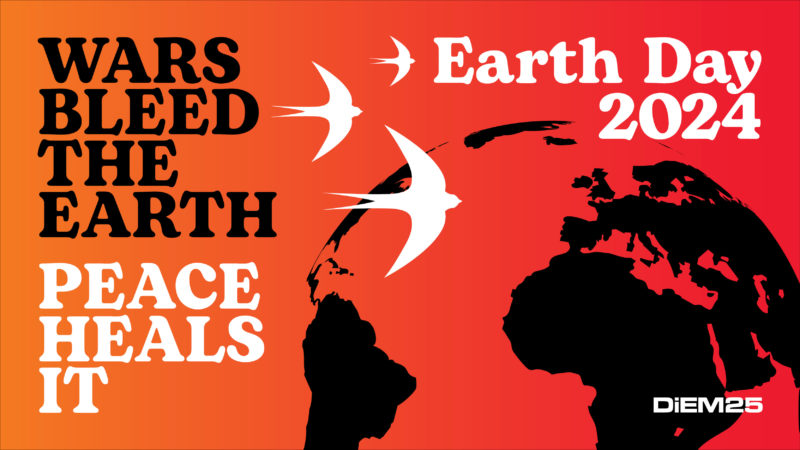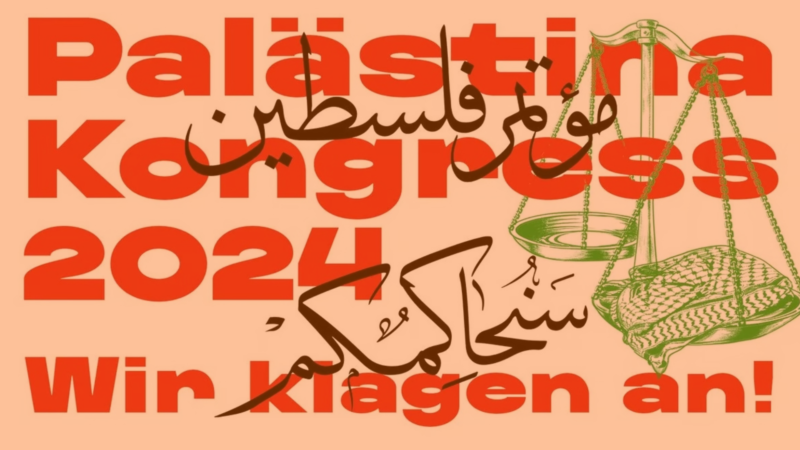We shouldn’t be angry at Tucker interviewing Putin, but instead at our own side’s dismissive and authoritarian attempts to avoid losing control of the narrative in such a high-stakes geopolitical moment
I’ve always been drawn to storms. They’re a marvel of nature, and I adore tracking them, watching them, photographing them. But people around me think storms are things are to avoid, and that I’m just being odd or contrarian. Their reaction gives me a weird mix of panic and guilt: What am I missing? What if they’re right?
I have the same feeling about the controversy surrounding Tucker Carlson’s recent interview with Vladimir Putin.
An unexpected conversation
Some context. Putin is a brutal, blood-soaked authoritarian. Tucker Carlson is a conservative; an ex-US cable TV host and now independent media provocateur with a show on Twitter.
He’s an unwatchable blowhard, who I disagree with on many fronts. He’s also one of the most influential voices on the American right.
I wouldn’t want to hang out with either of these people.
But as of writing, we’re moving into Year Three of a full-scale proxy war in Ukraine, between the two countries with the largest nuclear arsenals. A war that has killed and injured hundreds of thousands of Ukrainians and Russians, and is now limping to a bloody, dangerous stalemate. The US government is attempting to sink its largest ever military ‘aid’ package into the Ukrainian war effort; NATO countries are stepping up their support. There’s no end in sight, and since I last analysed the situation, and with the Middle East exploding, we’re closer than ever to a global conflict.
And yet – diplomatic relations between the US and Russia are at their lowest point in recent history. Russian and Western citizens exist largely in their own filter bubbles.
And until Tucker Carlson, not one American journalist had interviewed Putin since the war began.
Bridging gaps – or building walls?
Now, I think avoiding a catastrophic war between two major countries requires more understanding between their citizens, not less. To me, wars are failures of diplomacy, and military action is a last resort.
An interview with Putin in a Western media outlet would go some way to bridging this vital gap. Even if it’s just propaganda from Putin. And even if it’s blowhard Tucker Carlson asking the questions.
Yet here were the headlines when Tucker’s interview was announced:

Western legacy media lost their minds. EU politicians called for Tucker to be banned from travel, and said that covering Putin was “how democracies die”. Lawyers wondered whether the interview might be against US law. And Hillary Clinton labelled Tucker “a useful idiot… like a puppy dog.”
All of this was before the interview had even aired.
And much of my circle – which includes many anti-establishment types – forcefully agreed with all the above. Putin is the West’s adversary, they said. Sure, the US government and its servile allies aren’t perfect. But why would anyone want to hand our Putin a propaganda victory by putting a microphone in front of him?
Echoes of past mistakes
As with my soft spot for storms, I wonder if there’s something I’m not getting. The outrage over this interview seems misguided and crazy.
Sure, I expect the Biden administration to be unhappy with Tucker’s choice of guest. It’s populated by the same neoconservative armchair warriors who brought us Iraq, Afghanistan, Libya and other catastrophes. Through compliant Western legacy media outlets, they’ve built Putin into a cartoon character for years, a mini Hitler salivating over maps of Greater Russia while stroking a white cat. Now they’re warning that direct confrontation with this latest demon (after Saddam, Gaddafi, Milosevic, Assad et al), might be next.
Yet along with other US hawks, they’re losing the argument. Support for the Ukraine war among the American public has dropped. Trump, who claimed he’ll end the Ukraine war “in one day” via peace talks, is poised to take back the White House. So the hawks are on the defensive.
But it really breaks my brain that such a large swathe of Western media outlets, along with many ‘progressives’, simply echo their view. These journalists and activists display no critical thinking, have little consideration of the broader picture and the risks involved. They appear to have forgotten what ‘holding power to account’ means.
Propaganda, perspective, and the path forward
What are these folks worried about, exactly? That an interview with Tucker Carlson will turn Western news consumers into a Putin fanclub? Let’s turn to the interview itself to find out.
Here’s my take: First off, it’s quite embarrassing. Much of it is a history lecture from Putin on Russian’s relationship with Ukraine (though he stops short of saying “Ukraine = Russia”). Tucker squirms in his seat, providing fodder for a thousand memes.
And he doesn’t really challenge Putin in any way – the long list of ‘disappeared’ journalists in his host country probably looming large in his mind. He misses the chance to draw out the finer points of Putin’s position.
So yes, the interview is 100 percent propaganda.
But as mentioned, there’s no way it could be anything but! Just like every comment and op-ed from every Western official on Ukraine since the war began. Just like all those quiet briefings from unnamed state sources to journalists in side-street bars, that have led us into armed conflict… again and again and again.
Furthermore, what’s striking about Putin’s talking points is how familiar they are to anyone in the West who follows independent media outlets, or listens to commentators with views outside the established consensus. Oft-ignored points, like how NATO had promised Russia it would not expand “one inch” to the East – as has been historically documented – before embarking on multiple waves of expansion in that very direction. Like how Russia sought to join NATO in 2000, and was rebuffed. Like how Russia is open to dialogue, and claims to have no interest in a wider war.
So after enduring the full 90 minutes or whatever of listening to Putin, a Western news consumer with basic critical faculties might be left with a few thoughts:
- That Putin isn’t a defiant madman, but a rational actor. Perhaps even someone who the West could negotiate with.
- That instead of explaining the world in terms of good and evil, which party is ‘to blame’ for the Ukraine situation depends on when we start the clock.
- That instead of ‘their propaganda/disinformation/lies’ vs our truth, the reality is that the Russians just make different arguments. That are also rooted in fact. They simply select and emphasise different facts to our own side.
All of this chips away at the West’s cartoonish rationale for war.
TL;DR
We shouldn’t be angry at Tucker interviewing Putin, but instead at our own side’s dismissive and authoritarian attempts to avoid losing control of the narrative in such a high-stakes geopolitical moment.
Their PR gambit rests on the assumption that Western voters are too harried, distracted – indifferent? dumb? – to realise that the other side, too, has a case worthy of our attention.
They’re wrong. It’s not the storms we should fear, but the echo chambers we build to shield ourselves from them.
This article was first published on the Subvrt activism newsletter
Do you want to be informed of DiEM25's actions? Sign up here










